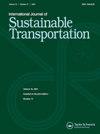考察泰国司机使用拼车平台的动机:技术接受模型和消费者感知价值视角
IF 3.9
3区 工程技术
Q2 ENVIRONMENTAL STUDIES
International Journal of Sustainable Transportation
Pub Date : 2025-07-03
DOI:10.1080/15568318.2025.2520351
引用次数: 0
摘要
本研究通过对泰国一家初创在线平台的实证分析,探讨影响司机使用拼车平台实现可持续共享交通的心理因素。本研究以技术接受模型(TAM)和消费者感知价值(CPV)理论为基础,采用多种定性方法。数据收集自20个司机访谈和网络档案数据,其中包括社交网站和从平台数据库中获得的数据,并使用主题分析进行分析。研究结果揭示了基于TAM的平台相关因素和拼车从CPV中获益的价值感知,因此为交通和同行供应商文献引入了供应商感知价值(PPV)的概念。值得注意的是,确定了三种新的价值类型,(1)功能,(2)关系和(3)优点。此外,本研究还提出了未来研究的概念模型。研究确定了拼车司机的9个特征,以及满足司机需求的策略,以及如何为研究中的初创公司和其他平台增加和维持司机数量。本文为政策制定者和政府与拼车平台合作提供了政策建议,以指导促进拼车的战略举措。这些倡议旨在支持联合国可持续发展目标,特别是可持续发展目标11(可持续城市和社区)和13(气候行动)。本文章由计算机程序翻译,如有差异,请以英文原文为准。
Examining drivers’ motivations to use a carpooling platform in Thailand: A technology acceptance model and consumer perceived value perspective
This study investigates the psychological factors influencing drivers’ use of carpooling platforms for sustainable shared transport, through an empirical analysis of a startup online platform in Thailand. The research is grounded in the Technology Acceptance Model (TAM) and Consumer Perceived Value (CPV) theory, employing a multiple-qualitative-methods approach. Data were collected from twenty driver interviews and netnographic archival data, which included social networking sites and data obtained from the platform’s database, and analyzed using thematic analysis. The findings reveal platform-related factors based on TAM and value perceptions of carpooling benefits from CPV, therefore introducing the concept of Provider Perceived Value (PPV) for the transport and peer provider literature. Notably, three new value types, (1) functional, (2) relationship, and (3) merit, were identified. Additionally, the study proposes a conceptual model for future research. Nine characteristics of carpool drivers were identified, alongside strategies to address drivers’ needs and how to increase and maintain driver numbers for both the startup under study and other platforms. The paper offers policy recommendations for policymakers and governments to collaborate with carpooling platforms to guide strategic initiatives to promote carpooling. These initiatives aim to support the United Nations’ Sustainable Development Goals (SDGs), particularly SDGs 11 (Sustainable Cities and Communities) and 13 (Climate Action).
求助全文
通过发布文献求助,成功后即可免费获取论文全文。
去求助
来源期刊
CiteScore
8.90
自引率
2.60%
发文量
56
期刊介绍:
The International Journal of Sustainable Transportation provides a discussion forum for the exchange of new and innovative ideas on sustainable transportation research in the context of environmental, economical, social, and engineering aspects, as well as current and future interactions of transportation systems and other urban subsystems. The scope includes the examination of overall sustainability of any transportation system, including its infrastructure, vehicle, operation, and maintenance; the integration of social science disciplines, engineering, and information technology with transportation; the understanding of the comparative aspects of different transportation systems from a global perspective; qualitative and quantitative transportation studies; and case studies, surveys, and expository papers in an international or local context. Equal emphasis is placed on the problems of sustainable transportation that are associated with passenger and freight transportation modes in both industrialized and non-industrialized areas. All submitted manuscripts are subject to initial evaluation by the Editors and, if found suitable for further consideration, to peer review by independent, anonymous expert reviewers. All peer review is single-blind. Submissions are made online via ScholarOne Manuscripts.

 求助内容:
求助内容: 应助结果提醒方式:
应助结果提醒方式:


